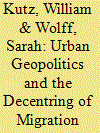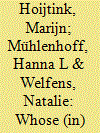|
|
|
Sort Order |
|
|
|
Items / Page
|
|
|
|
|
|
|
| Srl | Item |
| 1 |
ID:
159969


|
|
|
|
|
| Summary/Abstract |
Eurocentrism in the analysis of European foreign policy often renders scholars blind to other world views and realities, although engaging with these may be critical for understanding the relevance and impact of this policy in other parts of the world. Notwithstanding calls for decentring the study of International Relations and European foreign policy in particular, scholars of European foreign policy generally lack the tools and conceptual lenses to overcome Eurocentrism in their analyses. This article proposes an analytical framework to systematically open up for difference, and to see and understand dynamics and realities that go beyond dominant Eurocentric accounts, while trying to avoid the pitfalls of simplification and knowledge fragmentation. The framework consists of six partially overlapping decentring categories – spatial, temporal, normative, polity, linguistic, and disciplinary decentring – and is developed through two dimensions of the Decentring Agenda proposed by Fisher Onar and Nicolaïdis: ‘provincialising’ (questioning Eurocentric perspectives) and ‘engagement’ (learning from other perspectives). In this way, this article aims to support scholars of European foreign policy in overcoming Eurocentrism and in operationalising the Decentring Agenda.
|
|
|
|
|
|
|
|
|
|
|
|
|
|
|
|
| 2 |
ID:
189105


|
|
|
|
|
| Summary/Abstract |
In 2018, the International Organization for Migration stated that ‘migration has nearly become synonymous with urbanization, given the dominance of the city as the destination of most migrants’. The geopolitical dimension of migration governance is especially important in Mediterranean cities where the European Union’s (EU) efforts to push border management onto external actors has occurred alongside the transfer of new powers, competencies, and responsibilities for local authorities. Morocco is one such country where a number of administrative and territorial reforms have sought to transform the territoriality of migration governance, and by extension the structure of Euro-Mediterranean affairs. Our objective is to examine more fully how distinctly local aspects of Moroccan migration diplomacy have been harnessed as a force for geopolitical action today. The approach serves to decentre analysis of EU migration policy by rescaling the focus of migration to the urban peripheries of Europe, and to thereby contest Eurocentric accounts of migration governance in the region. Based on an analysis of Moroccan cities’ involvement in migration governance, including the MC2CM Project – a Mediterranean network of cities supported by EU and international actors – we argue that the rescaling of migration diplomacy aims to ‘change the narrative’ about Morocco’s capacity to manage immigration in light of international condemnation of state violence towards sub-Saharan migrants. In particular, devolution is skilfully used to cast Morocco as an advocate for the empowerment of local authorities managing migration, and migrants themselves as an opportunity for socio-economic development. At the same time, however, we observed that the rescaling of migration governance does not so much change the prevailing autocratic securitization of demographic mobility, but rather restructures its coordination through new governing actors (cities) and management techniques (migration).
|
|
|
|
|
|
|
|
|
|
|
|
|
|
|
|
| 3 |
ID:
193141


|
|
|
|
|
| Summary/Abstract |
Building on feminist and postcolonial theoretical approaches across International Relations (IR) and security studies, this Special Issue advances an emerging research agenda within EU studies by shedding light on the gendered and racialised logics of EU security and their links to colonial histories and practices. Together, the contributions to this Special Issue demonstrate how EU security is intrinsically connected to and constituted by histories of colonialism, racism and patriarchy. At the same time, they also highlight how the colonial, racialised and gendered dynamics that underpin EU security and that are mobilised by the EU, its institutions and member states are always complex and shifting. Importantly, they do so by decentring our analysis of EU security moving our focus often away from the EU and towards different, somewhat unexpected sites and geographical locations of EU security. The current war in Ukraine underwrites the need for more historical, contextual and decentred work on EU security, while also highlighting the necessity to reflect on dominant practices of knowledge production and the experiences of people living in and with war through a feminist and postcolonial lens.
|
|
|
|
|
|
|
|
|
|
|
|
|
|
|
|
|
|
|
|
|